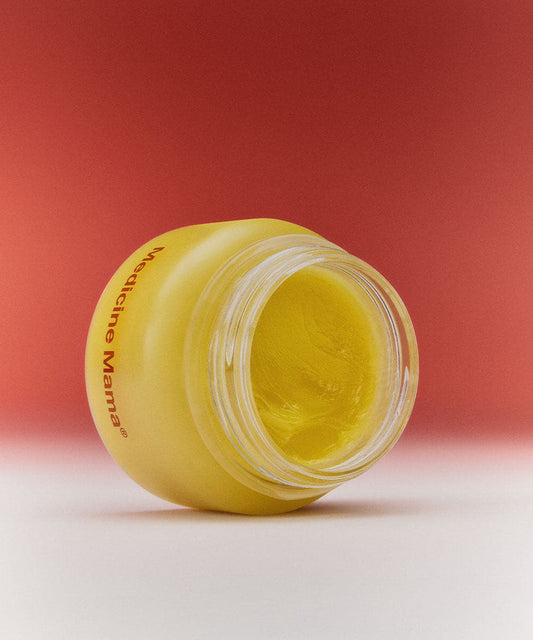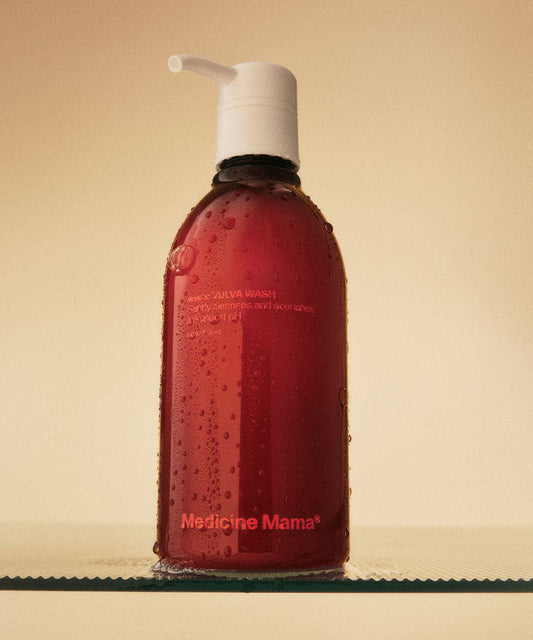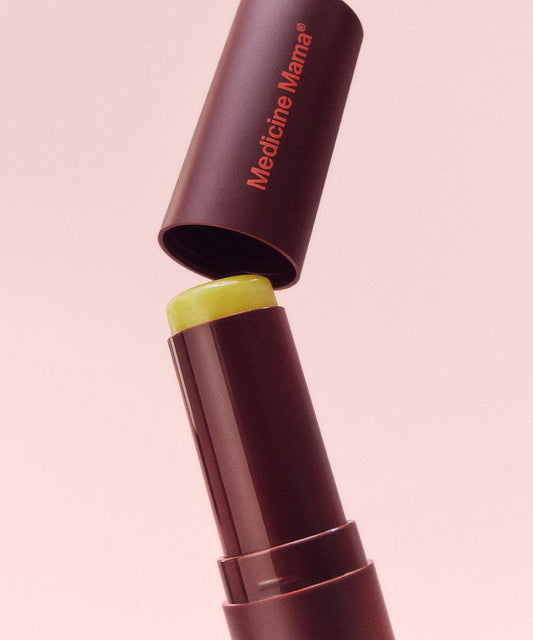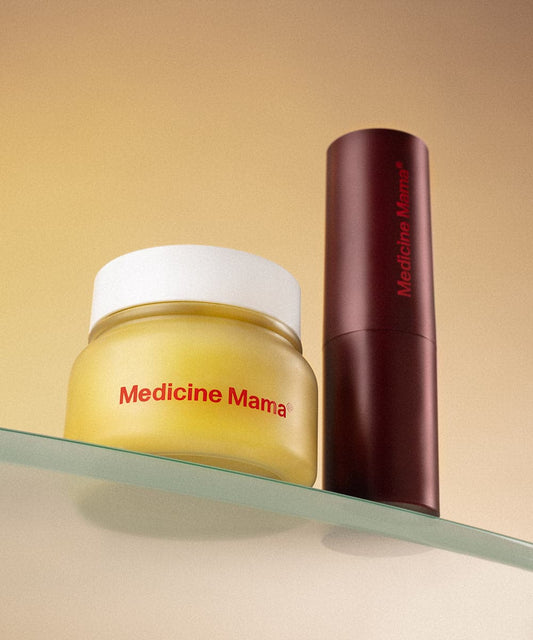Reviewed by | Melinda Hany
You walk into the lube aisle (or let’s be honest, scroll through it online), and suddenly, it’s like you need a chemistry degree to have good sex. Silicone-based, water-based, oil-based, natural, flavored, “tingling” — when did adding comfort to intimacy get so complicated?
At Medicine Mama, we’re all about making vulva care feel less confusing and more like a natural part of taking care of yourself. And yes, that includes lube. Whether you’re navigating hormone shifts, dealing with dryness, or just want things to glide a little easier, having the right formula on hand can make a huge difference.
So, if you’re stuck between silicone and water-based and wondering which one actually works better for lasting comfort, we’ve got you.
What’s the Difference Between Silicone and Water-Based Lube?
Let’s start with the basics. Both silicone and water-based lubes are designed to reduce friction and make intimacy more comfortable, but they go about it in different ways.
Water-based lubes are, well, water-based. That means they’re usually lightweight, easy to clean up, and compatible with just about everything — yes, including condoms and toys.
They tend to absorb into the skin a bit faster, which makes them feel more natural, but it also means they might need a little reapplying if things go on for a while. Think of them as the “let’s keep it simple” option.
Silicone-based lubes tend to be thicker, longer-lasting, and more resistant to evaporation. They don’t absorb into the skin the same way, which makes them ideal when you want things to stay slick from start to finish — no interruptions. They’re also waterproof, which is great for shower fun but not always ideal for silicone toys (the materials can clash, so check the label).
Texture-wise, silicone tends to feel silkier and glossier, while water-based feels more lightweight and almost invisible once it’s on. Cleanup-wise, water-based rinses off with a little soap and water, while silicone usually needs a bit more effort (and maybe a towel or two).
When Should You Choose One Over the Other?
It really depends on what you’re in the mood for and what you’re working with. Some nights call for one thing, other nights are a whole different vibe. Instead of memorizing a chart, try asking yourself a few quick questions:
- Is this a quick thing or a longer session? If you’re in for the long haul or trying out that new position you saw on TikTok, silicone is probably your best bet. It lasts longer and won’t dry up halfway through, which means less stopping and more momentum.
- Is your skin feeling extra sensitive lately? If your vulva’s been through it — shaving, hormone shifts, general life — a gentler formula might be the way to go. Water-based options tend to stay low-drama and rinse away easily without clinging too hard.
- Using toys, condoms, or just skin? Some lubes play better with certain materials than others. If you’ve got silicone toys in the mix, steer clear of silicone-based lubes (they don’t always get along). Water-based is your more flexible friend here.
- Are you planning to get wet and wild? If you’re heading for the shower, pool, or anywhere else with water involved, silicone is the move. It won’t rinse off the second things heat up.
End of the day, you don’t have to pick a side — this isn’t a reality show. In fact, it’s not a bad idea to keep both on hand, so you’re always ready, whether it’s a quickie before work or a full-on, candle-lit marathon.
Does the Vulva Prefer One Over the Other?
Kind of — but also, it depends on what your vulva’s been up to lately. If your skin feels calm and unbothered, either formula might work just fine. But if you’re dealing with sensitivity, dryness, or that vague “something’s off” feeling, your body might have a stronger opinion.
Water-based options tend to be the go-to during those more delicate phases, like after shaving, during hormone shifts, or when your skin’s just being extra. They rinse off easily and don’t tend to hang around in ways that can throw off your balance or leave behind any film you didn’t ask for. “They’re also much closer to your natural lubrication’s texture, so it can feel a little more ‘real’ if that’s important to you,” highlights Melinda Hany, Registered Nurse.
Silicone can feel more luxurious in texture and last longer, but that same staying power isn’t for everyone. If your skin’s a little reactive or picky, something simpler might just feel better.
So does your vulva prefer one over the other? Sometimes. What it really wants is comfort, ease, and products that don’t leave you second-guessing how your body feels afterward. Try both, pay attention, and let your vulva cast the deciding vote.
What To Look for When Shopping for Lube
You’ve got the lowdown on silicone vs. water-based, but knowing the difference is only half the battle. If you really want to avoid that awkward post-purchase regret, here’s what to keep in mind when you’re picking out your next bottle:
Check the Ingredients
First things first, check the label. Not all lubes are created equal; some come packed with ingredients that can mess with your body’s natural balance. Glycerin, parabens, added fragrances, and harsh preservatives can all lead to irritation, yeast infections, or just a general “not right” feeling.
If you have sensitive skin or a history of irritation, opt for something that’s pH-friendly, fragrance-free, and as simple as possible. That’s exactly why we made our Intimate Glide with organic, body-safe ingredients you can actually feel good about.
It’s free from all the junk that can throw off your vulva’s natural balance, and it’s designed to keep things comfortable, whether you’re flying solo or getting close with a partner.
Know Who You’re Buying From
Lube goes on some of the most sensitive skin on your body. So, maybe it shouldn’t be made by a company that also sells glitter body spray and bubble bath gift sets. Just saying.
When you’re shopping for something this intimate, it helps to choose a brand that actually specializes in vulvar wellness, not just sex-related add-ons. Look for companies that are transparent about their ingredients, run clinical tests, and work with experts who know the difference between the vulva and vagina (a surprisingly high bar).
At Medicine Mama, we don’t cut corners or hide behind cute packaging. We’re here to make vulva care clear, honest, and easy to trust. Because when you know exactly what’s going onto your skin, you can focus on how it feels, not whether it’s going to mess with your pH later.
Think About How You’re Going To Use It
Not all sex is the same, so not all lube needs are the same either. Are we talking quick solo sessions? Long, drawn-out partner play? Anal? External only? All of the above? The kind of intimacy you’re planning for can help narrow down what formula’s going to work best.
For example:
- If you're using glass or metal toys, pretty much any lube is fair game.
- If you’re into anal play, go for something longer-lasting with more cushion — like silicone — or a thicker water-based gel.
- If it’s for general dryness or daily irritation, a lightweight, water-based formula made for sensitive skin can help. But for everyday comfort outside the bedroom? Skip the lube and reach for our VMAGIC® Balm. It’s made to soothe, hydrate, and keep your vulva feeling like itself — no timing or towels required.
And if you’re dealing with sensitive skin (hello, menopause, postpartum, or just life in general), your body might need a little extra TLC. Lubes are great for reducing friction, but they don’t always address the root cause of discomfort—like skin that’s drier, thinner, or more prone to tears.
That’s where pairing your lube with VMAGIC Balm comes in. Use lube internally to keep things smooth, and apply the balm externally to strengthen, nourish, and protect your vulva. It’s the ultimate tag team for feeling good before, during, and after.
The Conclusion
So, which lube works best for lasting intimacy — silicone or water-based? That depends on the day, the mood, your skin, your toys, and whatever else is happening in real life (because let’s be honest, no two nights are ever quite the same).
Silicone is the MVP when you want staying power without the mid-session pit stop. Water-based is your go-to when skin’s feeling sensitive or you just want something that plays nice with everything. Both have their place. And sometimes, the smartest move is just having options.
At Medicine Mama, we’re all about giving you the tools to feel more in touch with your comfort, your confidence, and your vulva. Whether you’re looking for something to use in the moment or support for the everyday in-between, our collection is made to keep things simple, safe, and actually feel-good.
Because care should never be confusing, and intimacy should never feel like guesswork.
Sources:
Water-based lubricants are safe for vaginal use, a UCI study shows | UCI Health
Slippery Slope: Potential Hazards of Lubricants for Vaginal Tissue | Womens Voices
6 Lube Ingredients You Might Not Want to Put in Your Vagina | SELF
Female Sexual Anatomy | Vulva, Vagina and Breasts | Planned Parenthood



